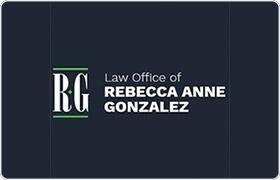San Antonio Family Law Lawyer, Texas, page 5
Sponsored Law Firm
-
 x
x

Click For More Info:
-
Law Office of Rebecca Anne Gonzalez
10101 Reunion Place Suite 615 San Antonio, TX 78216» view mapDivorce & Family Law Continuing The Gonzalez Legacy
At the Law Office of Rebecca Anne Gonzalez, my goal is to make certain you feel taken care of. My team and I work hard to protect what is important to you.
800-735-1530
Includes: Collaborative Law, Domestic Violence & Neglect, Paternity, Prenuptial Agreements
Warren Peter Mckenney
Construction, Elder Law, Family Law, Wills
Status: In Good Standing Licensed: 51 Years
Warren Peter McKenney
Construction, Elder Law, Family Law, Wills
Status: In Good Standing Licensed: 51 Years
Susan Rees Williams
International Tax, Family Law, Divorce & Family Law, Elder Law
Status: In Good Standing Licensed: 49 Years
Randall B. Richards
Construction, Litigation, Family Law, Consumer Bankruptcy
Status: In Good Standing Licensed: 48 Years
C. Reed Greene
Construction, Family Law, Business & Trade, Consumer Bankruptcy
Status: In Good Standing Licensed: 38 Years
Douglas Glenn Burford
Commercial Real Estate, Wills, Family Law, Divorce & Family Law
Status: In Good Standing Licensed: 27 Years
Sharon Frances Chapm Blakeney
Administrative Law, Family Law, International Other, Clean Air Practice
Status: Inactive Licensed: 25 Years
Patrick E. Hundley
Estate Planning, Construction, Personal Injury, Family Law, Criminal
Status: In Good Standing Licensed: 27 Years
Shawn Michael Lovorn
Juvenile Law, Federal Appellate Practice, Domestic Violence & Neglect, DUI-DWI, Criminal
Status: In Good Standing Licensed: 19 Years
 Rebecca Gonzalez San Antonio, TX
Rebecca Gonzalez San Antonio, TX Practice AreasExpertise
Practice AreasExpertise
